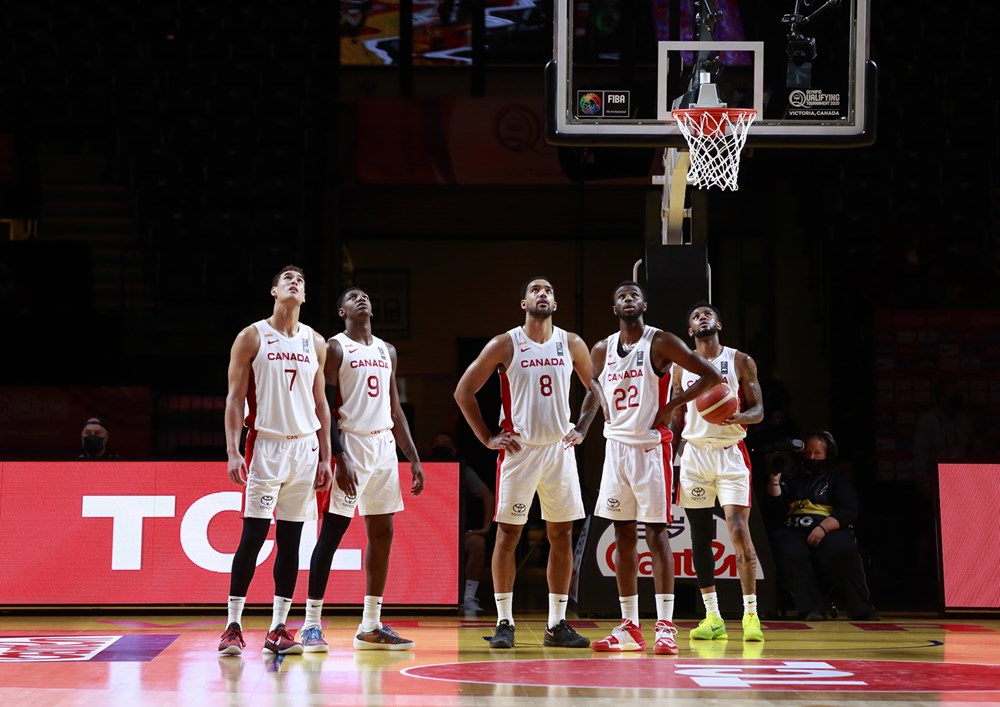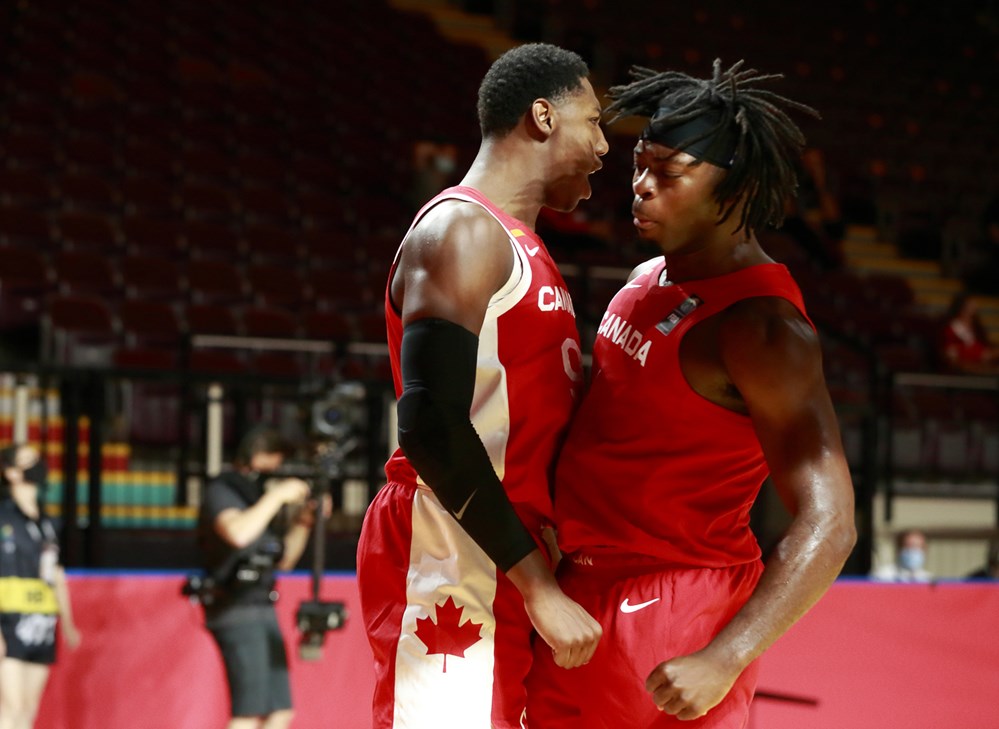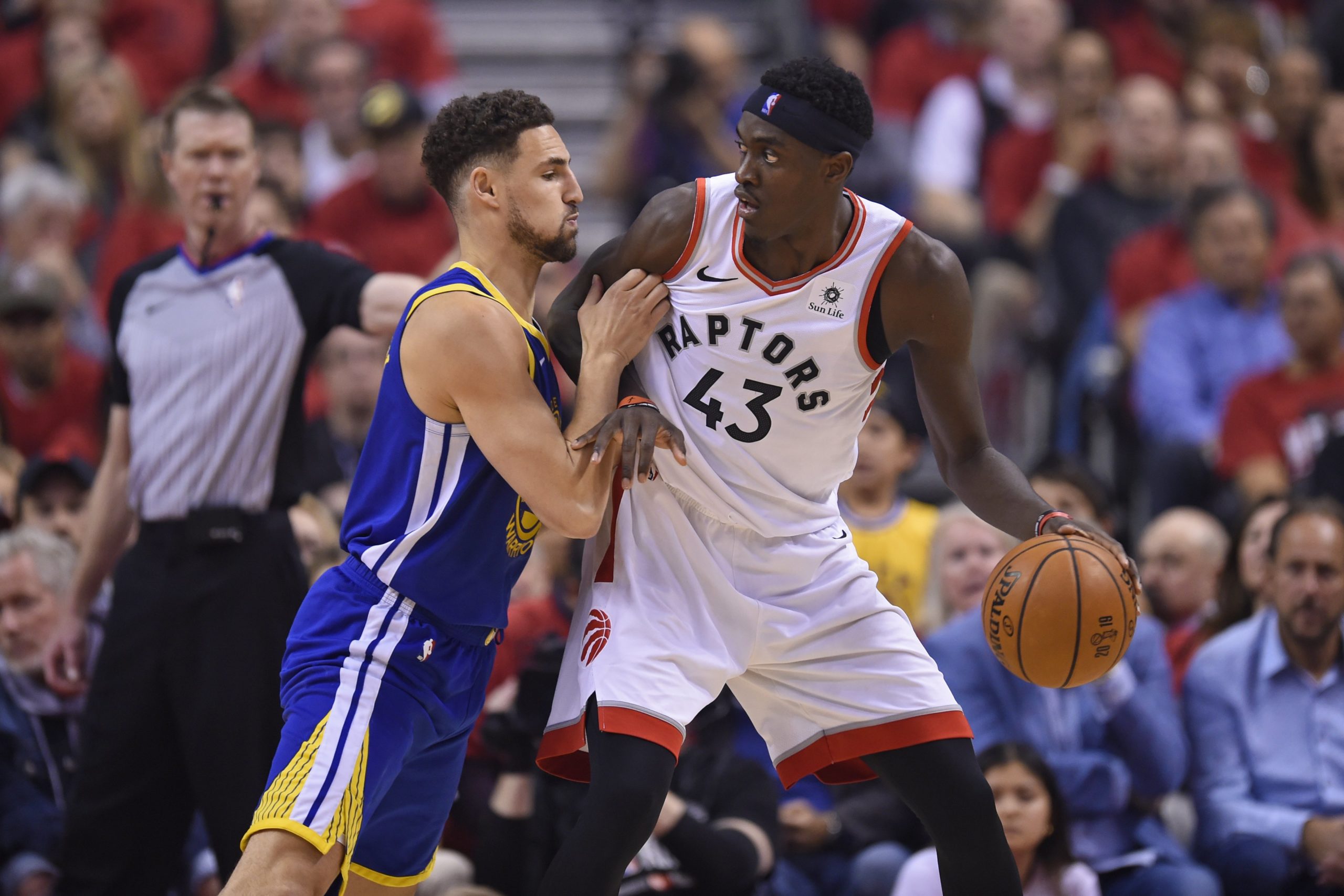VICTORIA, B.C. – An emotional RJ Barrett stormed off the court following Canada’s 101-103 overtime loss to the Czech Republic on Saturday afternoon. But rather than running to the locker room, Barrett ran up on one of the referees of the game — likely the one who ultimately decided to award a controversial unsportsmanlike foul to Trey Lyles late in the fourth quarter for what looked like a basketball play, giving the Czechs 4 free-throws and the ball — to give him a piece of his mind.
Despite being just 21 years old, Barrett has been one of the leaders of this Canadian team: a guy who, for better or worse, wears his feelings on his sleeve, and is constantly encouraging his teammates on the bench and the court. There was a moment in Canada’s opening win over Greece that comes to mind, where Barrett came into the game to replace Andrew Wiggins — who had kept his team in it with a scoring run in the third quarter — and Barrett embraced his teammate and let him know just how important he was.
Yes, Barrett is young, spending his 21st birthday quarantined in a hotel room ahead of Team Canada’s training camp, but it’s not all that surprising that he has taken on a leadership role on this team. After all, his father, Rowan Barrett, is the General Manager for Team Canada, and RJ has shown a commitment to the program since his teenage years, calling his gold medal in Canada’s under-19 world championship in 2017 probably “the most special basketball moment of my life.”
Barrett had the best game of his tournament in the semi-final against the Czechs, showing that veteran poise as he played a team-high 40:19 minutes with 23 points on 9/17 shooting with 5 rebounds, 6 assists, a steal, a block, and zero turnovers, refusing to settle for jump shots as he drove into the lane time and time again and got to the line 7 times.
Did he cross the line chasing the referees off the court after the game? Certainly. But the silver lining to Canada falling short of their Olympic goal once again is that, in RJ Barrett, they have a young player who is not only committed to this program longterm, but is as passionate about it as they come. In RJ Barrett and Andrew Wiggins, Team Canada has a wing-tandem that can carry this program forward for many years to come. However, in Tokyo later this summer, the Canadians will have to watch from afar.
—
For a brief moment in time, it looked like destiny had finally caught up with the Canadian senior men’s basketball team.
After the Czech Republic missed two free throws up 94-88 with 22 seconds remaining in regulation, Wiggins grabbed the rebound and dribbled the length of the court, driving into the lane to pick up the basket and the harm, making it a one-possession game. Then, the Canadians forced a turnover and Wiggins hit a pull-up three-pointer with a hand in his face, tying the game and ultimately sending it to overtime.
The Canadians had all the momentum. They had not only solved the Czechs on the defensive end long ago, double-teaming the post and rotating out to shooters, holding the Czechs to just 3 made field goals in the final 5:42 of regulation and forcing timely turnovers when it mattered most. But they also started to finally hit some shots and had the 800 or so members of the crowd cheering them on. The Czechs looked devastated, with Tomas Satoransky holding his head in disbelief as the regular time buzzer sounded.
“For us it was a little bit of a bad dream the way we finished that game,” Satoransky said. “I’m so proud of my team that we found strength. We made some big-time plays. I’m so proud of this group.”
In the opening possession of overtime, Trey Lyles forced a charge and Barrett assisted on a Nickeil Alexander-Walker three before picking up a basket and-one as the ball hung on the rim for a split second before spinning down through the mesh. Next, Blake Schilb’s open three-pointer went in-and-out, giving the Canadians a 99-94 lead with 2:20 remaining.
But then history went on to repeat itself for the Canadians, this time in a heartbreaking and surprising new way. With the game tied 101-101 after the Czechs got to the free-throw line on back-to-back possessions, Czech captain Tomas Satoransky dribbled out the clock for one final possession. With Lu Dort guarding him, sticking with him the whole way and taking away any and all breathing room, Satoransky hit a bank shot off the backboard, silencing the crowd with just 1.8 seconds remaining.
Nick Nurse called a timeout and drew up a brilliant disguise play. With everyone expecting the bigs to screen for one of the guards — likely Wiggins, who came alive in the second half and who’s midrange shot has been cash all tournament — the ball instead went directly to Lyles, who shot a wide-open 8-footer. It went in. And then it went out, with it the Canadian’s hopes to qualify for their first Olympic Games since 2000.
—
Unfortunately, the referees played a big part in deciding this game.
Wiggins and Dwight Powell — who I argued might have been Canada’s most important player this tournament due to his unique skill set on the defensive end — both picked up their third fouls early in the third-quarter after already being benched down the stretch of the second-quarter for foul trouble. Powell fouled out late in the fourth, and with only 23:30 minutes of playing time, the Canadians had to go small with Lyles at the five for long stretches, hurting them on the boards and in the post.
And then there was the controversial unsportsmanlike foul call on Lyles, who went to block Andrej Balvin’s shot after Powell already fouled him, making contact with Balvin’s head. The referees reviewed the play and, after originally not all agreeing on the call, decided to hand Lyles an unsportsmanlike foul in addition to Powell’s foul, giving the Czech’s 4 free-throws and the ball, making Team Canada’s comeback even more difficult.
“I mean, he did hit him and that stuff but he just kind of went up for the rebound and came down. There was nothing unnatural about it to me,” Nick Nurse said after the game. “Just two guys playing hard and going for a rebound and people getting tangled up.”
But that wasn’t the only time Team Canada was on the wrong side of some bad fortune in this game. The Canadians shot 9/37 from three, making their fifth at the 8:19 mark of the fourth quarter. In fact, Czech guard Blake Schilb out-shot them from three by himself for most of the ballgame, finishing 7/12 for a game-high 31-points. The Canadians were getting good shots, but they just weren’t falling.
“I thought we adjusted really well. In the second-half I thought we had a lot of really good open looks, and it just didn’t bounce our way tonight,” Nurse said.
In terms of that adjustment, the Canadian’s defense got better as the game went along. After a few defensive breakdowns early that led to open three-pointers for Schilb and post-up fouls for Balvin and backup center Patrik Auda — who went to the line a combined 13 times — the Canadians cleaned up their coverages, fighting over screens and helping eachother out in rotations, with hands in all the passing lanes. Offensively, they stopped relying on the three-ball and started driving into the paint almost every single possession, going to the line a combined 31 times.
“ I think that we played the way we needed to play in the second half but it took us kind of too long to try to adjust, I thought. It was ultra-ultra physical out there. The screening and whatnot, but that’s this [FIBA] style,” Nurse said.
“Every time we drove they just hammered us, right? So, we had to play through that. Then we started, I thought we did, we generated some great shots. We didn’t make a lot of the great ones, but what do you do? You try to generate and get next action and get it in the paint and get it out and around and if you get the open look you take them and we did. If we hit a couple more, I think that would have probably energized us a lot, particularly in the third.”
—
For the most part, the adjustments worked. And Nurse drew up a brilliant play at the end to free Lyles up for an open look. If it fell through and the Canadians won, Nurse would be getting all of the praise right now.
But it didn’t, so just like in any loss, there are holes to poke. One’s in the rotation, which could have been shorter and relied on Alexander-Walker and Lu Dort more and Cory Joseph less considering he was -21 in 18:16 minutes.
The big hole, however, is the one related to the only player who could argue he deserved more — whether it’s the final shot or just more of the ball in his hands late in the fourth quarter and overtime — Andrew Wiggins.
Wiggins was the best and most consistent player for the Canadians in this tournament. In the group stage, he became one of three players to score 20+ points in each of his two games in the Olympic qualifying tournament. Then, after a slow start against the Czechs, Wiggins turned it on, getting to his spots in the midrange and driving into the lane for 5 free-throws. He finished the game with 22 points on 8-15 shooting and 8 rebounds, 3 assists, and 3 steals.
But after tying the game in the final moments of regulation, Wiggins only had 1 field-goal attempt in all of overtime: a self-created pull-up jumper from the midrange. Sure, Nurse could have drawn up a mid-range look for Wiggins with the game on the line considering that is a shot he has looked confident making all tournament, but more than that, Wiggins could argue he should have got the ball more late in the fourth and in overtime. He was the only Canadian that could consistently create his own shot in this tournament, and instead of trusting him to take them home — or instead of him taking the game in his hands and demanding more of the ball — the Canadians trusted their egalitarian team-offense until the bitter end.
—
Canada’s 2021 Olympic hopes are dead, but the program is still in good hands. From CEO Glen Grunwald down to General Manager Rowan Barrett and head coach Nick Nurse to the players, the golden age of Canadian men’s basketball is still to come. That won’t take away from the sting of this loss, but as Team Canada veteran Andrew Nicholson put it, there is a silver lining.
“There was a little disappointment. But there was also the light at the end of the tunnel,” Nicholson said after the game. “Cory [Joseph] actually made a nice speech to us that the future is bright. We just need to stay together. That’s just sometimes how the ball game goes, honestly. We’re just gonna look forward to our next opportunity as a basketball team.”
As Joseph put it: “These games happen too much for our liking, but it’s something we have to continue to chip at, continue to hammer the rock, because FIBA’s not going anywhere for a long time. Even if it’s not me, the younger generation, that’s who I think we all do it for.”
“We go, obviously, out for ourselves, but we want the younger generation to be inspired like we were inspired with [Steve] Nash and all of those guys.”
There are, of course, stars in the waiting, including a fantasy-inducing future backcourt of Shai Gilgeous-Alexander and Jamal Murray. But what the Canadians have show in Victoria is that they have enough talent already, especially in the Barrett-Wiggins tandem, who both seem to excel in the international game and who could carry this program forward for years to come if they stay committed. While Joseph might be back in the qualifying stages for the 2024 Olympics, it is Barrett who I would bet my high-paying Raptors Republic salary on captaining the next great team. He has what it takes and cares deeply about the program.
“There’s tremendous character. There’s tremendous personality. There’s tremendous talent. There’s tremendous work ethic by the guys that committed,” Nurse said. “I think if we can get a group of guys that stick together for some years, that always helps. Case in point is tonight. I’m not making any excuses for tonight. We had our chances. We did. We had our chances. [Now we need to] continue to build our program, learn a lot from this, and continue to build it.”



